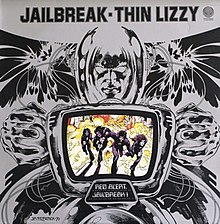Jailbreak (album)
| Jailbreak | ||||
|---|---|---|---|---|
 |
||||
| Studio album by Thin Lizzy | ||||
| Released | 26 March 1976 | |||
| Recorded | December 1975 – February 1976, Ramport Studios, London | |||
| Genre | Hard rock, blues rock | |||
| Length | 36:15 | |||
| Label |
Vertigo (UK, Canada) Mercury (US) |
|||
| Producer | John Alcock | |||
| Thin Lizzy chronology | ||||
|
||||
| Professional ratings | |
|---|---|
| Review scores | |
| Source | Rating |
| AllMusic | |
| Robert Christgau | (B−) |
| Classic Rock | |
Jailbreak is the sixth studio album by Irish hard rock band Thin Lizzy, released in 1976. It proved to be the band's commercial breakthrough in the US, and the only Thin Lizzy album with a certification (in this case, Gold) in that country. The singles include "Jailbreak" and "The Boys Are Back in Town", the latter being Thin Lizzy's biggest hit.
After their previous two albums, Nightlife and Fighting, failed to generate sales, Thin Lizzy were given one last chance by their record label, Vertigo, to make a successful record. The band wrote songs and collected ideas in a studio in Buckinghamshire in late 1975, then convened at Ramport Studios in London in the new year. The band selected John Alcock as their producer, as he had worked in the studio extensively. The band worked diligently through February on the album. However, Gorham and Robertson felt that the speed at which it was completed adversely affected its quality. Both stated that the tightness of the songs made the album feel rigid. In particular, Robertson said that he would have liked more freedom to improvise on his lead guitar parts. Gorham also criticized Alcock's production, saying that he didn't particularly care for his guitar tone on the album.
Initially, the song "Running Back" was chosen to be a single ahead of "The Boys Are Back in Town", the latter being seen as possibly too aggressive for some radio stations to play. Frontman and songwriter Phil Lynott and producer John Alcock decided to employ session musicians to add more commercial elements to some of the tracks to try to produce a hit single, and Tim Hinkley was brought in to add keyboard parts to "Running Back". Guitarist Brian Robertson was against the idea, as he liked the song as it had originally been arranged, in a blues format with his own additions of piano and bottleneck guitar. He later said, "I took enormous offence to [the changes]. I couldn't understand why they'd pay this guy a fortune just for playing what he did. Listen to it and tell me it's not bollocks." Robertson did not play on the finished version of the song and Hinkley is not credited on the album sleeve. Lynott said at the time that "Running Back" was "very much influenced by Van Morrison. I really like that song." Hinkley later recalled, "Robbo and Scott were not keen on it at all but they were overruled." Thirty-five years later, Robertson recorded his own versions of the song on his 2011 album Diamonds and Dirt.
...
Wikipedia
